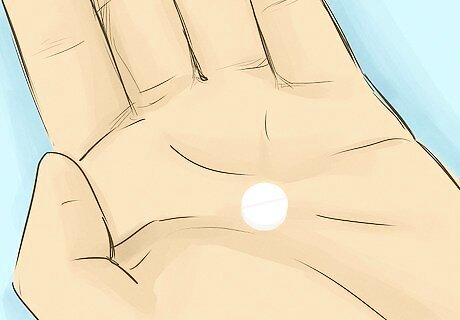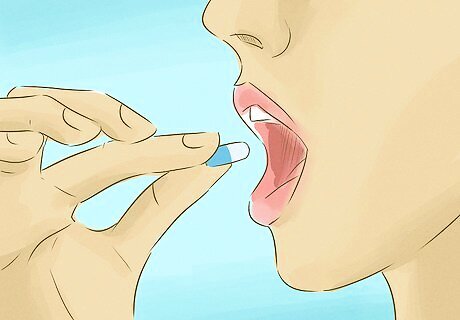
views
Medical Considerations

Ask your doctor if ALA is a good choice for you. Before starting any supplement, always consult your doctor first, as supplements can have side effects and interactions. For instance, ALA can lower your blood sugar levels, which can affect how much insulin or other diabetes medicines you need if you are diabetic. ALA can also lower your thyroid hormone levels, so talk to your doctor if you have a thyroid condition. They may need to monitor your hormone levels more closely. Some doctors are not experts in how supplements interact with regular medications. If yours isn't, visit a doctor who also specializes in alternative or holistic medications, or talk to a pharmacist.

Talk about doses. While most supplements come with dosing recommendations, a doctor will offer better advice for your particular situation. For instance, the right dose for you might depend on factors like your age, your overall health, or the condition you are hoping to treat. Your doctor may recommend you start on a lower dose and work up to a higher dose. Because ALA can affect your blood sugar levels, any diabetic medications you're on may need to be adjusted.

Discuss whether ALA will help your diabetic neuropathy. The main benefit of this supplement is to help with diabetic neuropathy. It may slow the spread of this condition or even reverse the effects, bringing feeling back into areas that have lost it. Talk to your doctor about whether it makes sense for you to take it for this condition. This supplement may not work for everyone. The data on its benefit for diabetic neuropathy are promising, but still inconclusive.
Dosage

Try 200 to 400 milligrams a day for antioxidant support. While there are no standard doses for ALA, this amount can increase your antioxidant intake, as ALA is an antioxidant. Take the tablet or tablets by mouth once a day or as often as directed by your doctor or pharmacist. This antioxidant may help protect your nerves from damage.

Take 800 milligrams for diabetes and diabetic neuropathy. You'll need a higher dose to help with diabetic neuropathy, typically around 800 milligrams a day. However, because it's a higher dose, you may need to split it up into multiple doses throughout the day. Talk to your doctor about the best dose and schedule for taking your supplements. Your doctor may recommend starting out with a lower dosage, such as 200 milligrams a day. Some older adults may have unwanted side effects, such as heartburn, diarrhea, or dizziness, when taking higher doses (e.g., over 600 mg). Talk to your doctor if you are concerned about side effects.

Discuss intravenous ALA with your doctor. This supplement is also given intravenously sometimes to help with diabetic neuropathy. Talk to your doctor about whether this option is a good one for you. You may need to receive an infusion daily over a period of a few weeks to get the best results. Typically, you'll be given between 250-600 mg at each treatment, starting at the lowest dose to make sure you don’t experience any major side effects. Each session lasts at least 20 minutes. To give the infusion, a medical professional inserts a needle into your arm or hand, and then attaches an IV bag with this medication to the needle. Then, the medication enters your body through the needle.
Side Effects

Watch for skin rashes. While rashes and other skin symptoms are relatively rare, they are the most common side effects of ALA. The rash can differ from person to person. If you notice a rash appears on your skin after taking this medication, stop taking it and talk to your doctor. You might also notice itching or hives. If you notice any swelling in your throat, face, or mouth, get emergency medical attention immediately.

Pay attention to an upset stomach. This side effect is also rare, but it can happen. If you've noticed you are having more stomach problems after starting ALA, your new supplement may be the cause. If the stomach issues don't bother you too much, you may still be able to take this supplement. Taking it with a meal may help. Your doctor may also be able to recommend or prescribe medications that can reduce these symptoms.

Look for signs of low blood sugar. Signs of low blood sugar include headaches, hunger, sweating, and dizziness. You might feel woozy, like you could lose consciousness. You might also feel confused or cranky. If you suspect you have low blood sugar, test your blood sugar level. Anything under 70 mg/dL is too low. To increase your blood sugar levels, try eating or drinking something with sugar, such as orange juice or glucose tablets.
Precautions

Avoid taking an ALA supplement if you have a thiamine deficiency. If you have a thiamine (vitamin B-1) deficiency, ALA can be toxic. If you are alcoholic or drink alcohol regularly, you can develop a thiamine deficiency. Don’t take ALA if you drink alcohol heavily or know that you have a thiamine deficiency. Ask your doctor to check your thiamine levels. Taking a thiamine supplement may help with this issue. Talk to your doctor about this option.

Discuss interactions with thyroid medications. This medication may lower your thyroid hormone levels. Therefore, if you're taking medications like Levothyroxine, discuss this possible interaction with your doctor. Your doctor may adjust the dosage of your thyroid medication, or they may want to monitor your thyroid hormone levels more closely.

Talk to your oncologist before starting this supplement. Because it is an antioxidant, ALA may interfere with some cancer medications. Discuss this medication with your oncologist before you begin it. You don't want to sabotage your cancer treatment unintentionally.




















Comments
0 comment